Quoting particles are also called quotative markers. In Japanese, in'you 引用, "quotation," "citation," refers to their function: in'you no joshi 引用の助詞, "particle of quotation."
Manga: Doushirou degozaru 道士朗でござる (Chapter 5, 道士郎、ブチ切れる)
List
Here's a list of the Japanese quoting particles:- to と
Formal quoting particle.
Informally used with thoughts. - tte って
Casual quoting particle.
Normally used with speech.
Yep. It's just two.
Note that these particles have functions besides quoting.
The to と particle can act as a conjunction, the conditional to と, and can also translate to "and," as a parallel marker.
The tte って particle can also mark the topic of a sentence. See: tte って topic marker.
Besides the above, there are a few contractions worth noting about. In anime, contractions like the below are often used by delinquents, gyaru ギャル, and so on.
- ttsu っつ
Contraction of tte iu っていう.- ttsu ka っつか, ttsu no っつの are contractions too.
- teyuka てゆか
Contraction of tte iu ka っていうか - teka てか
(same.)
Usage
Direct Quotations
Quoting particles are used in diverse ways in Japanese. The most basic way is to literally quote what someone says. In this case, the quotation marks 「」 are used:- Tarou wa "hai" to itta
太郎は「はい」と言った
Tarou said "yes." - Hanako wa "daga kotowaru!!" to kotaeta
花子は「だが断る!!」と答えた
Hanako answered "but [I] refuse!!"
Similarly, the quotation may also be of something that was written rather than spoken.
- {"tachi-iri-kinshi" to kakareta} kanban
「立入禁止」と書かれた看板
A signboard [on which] {was written "entrance forbidden"}
A signboard which reads "no entry." (no trespassing, etc.)
Note that, in English, "reads" can be used to say what's written on something. The same doesn't apply to the verb "to read," yomu 読む in Japanese.
- ?kanban wa "tachi-iri-kinshi" to yonda
看板は「立入禁止」と読んだ
?The signboard read "no entry."- A signboard doesn't have eyes, so it couldn't have read anything.
Indirect Quotations
Most of the time, the quotation particle won't accompany quotation marks in Japanese.I guess that's because, unlike English, the presence of the particle already means the phrase is a quote, so there's less need to use quotation marks to express quotations orthographically.
- Tarou wa hai to itta
太郎ははいと言った
Tarou said yes.
Thoughts
Indirect quotations are often used with verbs that express thought. For example:- sore wa ii
それはいい
That is good. - sore wa ii to omou
それはいいと思う
[I] think: that is good.
- shippai suru
失敗する
It fails. It will fail. - shippai suru to yosou dekiru
失敗すると予想できる
[I] can predict: it will fail.
Naming Things
The quotation particles are also often used to say what something is called. There's a few verbs which can be used to do this. The one closes to English would be:- sekai wa sore wo ai to yobu-n-da ze
世界はそれを愛と呼ぶんだぜ
The world calls that love. (song by Sambomaster.)
Normally, however, the phrase to iu と言う, or toiu という, toyuu とゆう, is used instead. This is the verb "to say." It's used in the sense of: "you 'say' this thing using this word."
For example:
- kore wa neko to iu-n-da
これは猫というんだ
[People] say "cat" [to refer] to this.
[You] say "cat" [to refer] to this.
This is called a cat. - kore wa neko tte iu-n-da
これは猫っていうんだ
(same meaning.)
In introductions, the polite verb moushimasu 申します is used to say how you're called. This is the polite conjugation of the verb mousu 申す, which means "to say," but is more formal than iu 言う.
Since this verb is polite, you wouldn't use the casual tte って with it, so, normally, it only appears in the form of to moushimasu と申します.
- watakushi wa Tarou to moushimasu
ワタクシは太郎と申します
I'm called Tarou.
Anonymous Quotations
When the sentence is in the passive voice, the quotation becomes anonymous. That is, the fact something was said is expressed, but not by whom it was said.This is trickier to make sense of in Japanese, because the subject of the sentence if often omitted, even in active voice, so I'll explain how it works in English, first. Observer the two sentences below:
- John said that the Earth is flat.
- It's been said that the Earth is flat.
Both sentences refer to a same event. John said something, therefore, also: something has been by John. However, when people say "it's been said that," or "it's been thought that," and so on, it's usually because they don't have a person whom to attribute the saying.
It's been said that the Earth is flat. Okay, but who said it? At first glance, it sounds like there's a consensus: lots of people say that the Earth is flat, I hear that all the time. But if just one single person says the Earth is flat, the fact that "it's been said" remains true.
For reference, see the Wikipedia article on weasel words.
In Japanese, a similar effect can be achieved by using the passive voice. For example:
Manga: Karakai Jouzu no Takagi-san からかい上手の高木さん (Chapter 4, 筋トレ)
- Context: Nishikata 西片 is making an habit of exercising. Takagi 高木 teases him.
- seichouki ni
kin-tore shisugiru to
shinchou tomacchau
tte iwareteru no.
成長期に
筋トレしすぎると
身長止まっちゃう
って言われてるの。
It's said that: during the growth-period (of a child growing in height), if [you] exercise too much, [your] height ends up stopping [growing].- They say if you exercise too much, you stop growing up!
- Contractions:
- tomacchau 止まっちゃう
tomatte-shimau 止まってしまう
Ends up stopping. - iwareteru 言われてる
iwarete-iru 言われている
Is been said.
Above, Takagi uses the passive voice to sound like experts agree on something. Like a bunch of doctors have said it on TV and magazines before. As it turns out, this anonymous authority doesn't actually exist. In fact, nobody even said that. Takagi just made it up.
Similarly, phrases like to omowareru と思われる, "it's thought that," is used to sound like there's a consensus on a scientific theory about something.
Of course, just because the grammar makes the authority anonymous, that doesn't mean the statement is actually made in bad faith. For example:
- {"shinigami" to yobareru} otoko
「死神」と呼ばれる男
A man [who] {is called "God of Death."}
Above, the {relative clause} is in the passive voice, so we can't attribute "by whom" that man has been called shinigami. That doesn't mean it's a lie. It could be that he goes around beating people up, and has become famous because of that, and everybody does in fact call him that.
Interchangeability
The quoting particles are interchangeable with verbs of speech, like to say, to answer, to ask, and so on. In this case, tte って is more common in casual, spoken speech, and to と with formal, written speech.
- muri da to itte-iru no desu
無理だと言っているのです
[I] am saying that it's impossible. - muri da tte itteru-n-da
無理だって言ってるんだ
(same meaning.) - muri da ttsu-tte-n-da
無理だっつってんだ
(same meaning.)
With thoughts, however, the to と particle is usually preferred over tte って, even in spoken speech.(Nilep and Fujimoto:2017:4–5)
- sore wa ii to omoimasu
それはいいと思います
[I] think that's good. - sore wa ii to omou
それはいいと思う
(same meaning.) - sore wa ii tte omou
それはいいって思う
(same meaning.)
The ttsu っつ contraction is supposed to be tte iu っていう. That means it's not used with other quoting verbs. For example:
- *sore wa ii ttsu omou
それはいいっつ思う
(you can't use it with omou, because this means...) - *sore wa ii to iu omou
それはいいという思う
*[I] "think said" that's said.
It can go before the noun form of verbs, though, since that just acts as a relative clause.
- sore wa ii ttsu omoi
それはいいっつ思い
(valid, because...) - {sore wa ii to iu} omoi
それはいいという思い
The feeling [that] {that is good}.
At End of Sentences
Quoting particles are sometimes used at the end of sentences. There are a few ways this happens.The most literal way is when a quoting particle is used to report what someone said. In this case, it's just like if you said tte itta って言った, "[someone] said," but with the verb omitted.
Manga: Doushirou degozaru 道士朗でござる (Chapter 5, 道士郎、ブチ切れる)
- Context: there are rumors Doushirou 道士朗 was in a fight in school. One student confirms the rumor with another.
- go-nin mo ita noni attoyuuma ni yattsuketa tte.
5人もいたのにあっとゆうまにやっつけたって。
[Someone said that]: there were five people, and [he] beat [all of them] in a blink.- attoyuuma あっとゆうま
{"a'" to iu} ma 「あっ」と言う間
The span of time it takes {to say "ah"}.
A very short time. Before you can say "ah."
Before you can blink.
- attoyuuma あっとゆうま
- aa, go-nin wa yattsuketa, hon no isshun de.
あぁ、5人はやっつけた、ほんの一瞬で。
Yeah, five people, [he] beat, in just one instant.- de で
Used to mark the time it takes to complete a task. In this case, it takes one instant to people people.
- de で
- shikamo kan de.
しかもカンで。
And using [his] intuition.- de で, again.
Used to mark the instrument, method, or manner something is done. In this case, Doushirou beat five guys in a fight, instantly, and intuitively.
- de で, again.
Most of the time you'll see the particle used like above: "someone" said, and we don't know for sure who is it supposed to be. Maybe we do know because we've seen them saying it in the manga previously, but the point is: the person quoted isn't obvious from the sentence.
Although less common, there's a case where the person quoted is a lot more obvious than that. When you have three people: A, B, C, and A asks B to ask C something, or something like that, then, when C answers, B relays, quotes, the answer for A. For example:
Manga: Kaguya-sama wa Kokurasetai ~Tensai-Tachi no Ren'ai Zunousen かぐや様は告らせたい~天才たちの恋愛頭脳戦~ (Chapter 6, 白銀御行は隠したい)
- Context: a guy remembers his dark past.
- konaida mo----
こないだもーー
The other day, too... - nee, kimi tte
kanojo toka iru noo?
ねー君って彼女とかいるのー?
Hey, do you have a girlfriend or something like that?- The tte って here is a topic marker, not a quotative marker.
- e...... inai kedo......
え・・・・・・ 居ないけど?
Eh...... [I] don't, but [why are you asking?]...... - yappari!
やっぱり!
[Just as I thought]! - kanojo inai tte~~!
彼女居ないってー!
[He said] [he] doesn't have a girlfriend! - isou ni nai mon ne~~!
居そうに無いもんねー
[He] doesn't seem like [he] would have [one], right~~- Here, a second girl says the guy doesn't looks like he would have a girlfriend. She's judging him by his appearances.
- mon もん
(nominalizer.) - ne ね
Right?
- chou ukeru!
超ウケル!
[That's] super funny!- ukeru 受ける
To receive. (literally.)
To find funny. (slang.)
- ukeru 受ける
- fufu'
ふふっ
*giggle*
Note that the construction dato だと sometimes works metalinguistically. That is, dato だと can go after i-adjectives and verbs, even though the da だ copula alone can't, because this da だ is syntactically outside of the quote, not inside as you'd normally expect.
Manga: Dragon Ball, ドラゴンボール (Chapter 225, ナッパ ても足も出ず)
- ko' kono
ore-sama ga
taishita koto
nai dato......!!!!
こっ このオレさまがたいしたことないだと・・・・・・!!!!
Th-- this me isn't [a big deal], [you say]......!!!!- Here, nai da ないだ would be ungrammatical if not metalinguitic.
- sou da
そうだ
[That's right.] - ima no kougeki de
wakatta
いまの攻撃で わかった
With [that] attack [just] now [I] realized.
(Goku figured Nappa isn't a big deal from how weak his attack was.)
Another case are the phrases nanda-tte 何だって and nanda-to 何だと, which mean "[they] said what?!"
Besides saying verbs, the quoting particle can also omit the verb omotta 思った, "thought." This is often easy to tell by the fact a doubt or wonder particle like naa なぁ will precede tte って.
- benkyou shiyou ka naa tte
勉強しようかなぁって
[I thought]: [maybe] [I] should study, [I guess].
Sometimes, to-wa とは abbreviates to-wa omowanakatta とは思わなかった, "[I] didn't think that."
- masaka ano kougeki wo taeru to wa...
まさかあの攻撃を耐えるとは・・・
I didn't think: [he] unexpectedly would endure that attack.
I didn't expect him to survive that hit. - Tarou wa Hanako to kekkon suru to wa na~
太郎は花子と結婚するとはな~
That Tarou would marry Hanako.- to wa omowanakatta na~
とは思わなかったな~
[I] didn't think [that would happen, huh].
[I] never thought [that would happen, huh].
- to wa omowanakatta na~
Manga: Dragon Ball, ドラゴンボール (Chapter 226, 界王拳の謎)
- Context: Vegeta sent his underling to fight Kakarot. His underling lost. Vegeta is perplexed.
- nasakenai
yatsu da
なさけない やつだ・・・・・・
[What a] pathetic guy.
(referring to a guy who just lost to Kakarot.) - masaka
ano Kakarotto aite ni
kono ore ga wazawaza
ugoku koto ni
naru towa na......
まさか あのカカロットあいてに このオレが わざわざ 動くことに なるとはな・・・・・・
[It's unbelievable that]
against that Kakarot
I (kono ore) would have to [fight.]
(i.e. Vegeta didn't expect it would need his super-superior powers to beat a small-fry like Kakarot.)
The phrase towa とは can also abbreviate towa nan-desu ka? とはなんですか?, "what is it?"
At Start of Sentences
There are cases where a quoting particle may appear to be at the start of a sentence. For example
Manga: Karakai Jouzu no Takagi-san からかい上手の高木さん (Chapter 2: プール)
- Context: Nishikata 西片 remembers something he heard from someone who heard it from someone else.
- {mune no chiisai} joshi tte,
{sono koto wo
ki-ni-shiteru} baai ga
ooi rashii ze.
胸の小さい女子って、
そのコトを
気にしてる場合が
多いらしいぜ。
I heard that:
regarding girls [with] {small chests},
the cases [in which they] {be worrying about that are many}.- i.e. there's a rumor flatter-chested girls often have complexes about it.
- ki ni suru 気にする
To mind. To think about. To care about. To worry about.
- tte, san-kumi no
Kimura ga...!!
って、3組の
木村さんが…!!
is what Kimura from the class 3 said!!- Kimura is marked as subject (Kimura ga) of a sentence that has no verb.
- Because of the quoting particle tte, we can safely assume the implicit verb is supposed to be "to say," iu 言う.
- Kimura ga itta
木村が言った
Kimura said.
Above, when Nishikata starts his sentence with tte って, he's actually quoting what Kimura told him.
This sort of monologue can't happen in real life, only in manga and anime where you can hear flashbacks and that sort of stuff, however, this delayed usage of tte って that appears at starts of sentences can happen in other, more real-life ways, too.
For example, if you're telling someone what they have to say, and what will happen when they say it.
Manga: Kaguya-sama wa Kokurasetai ~Tensai-Tachi no Ren'ai Zunousen かぐや様は告らせたい~天才たちの恋愛頭脳戦~ (Chapter 6, 白銀御行は隠したい)
- Context: the student council president explains the power of kabedon.
- ore to
tsukiae......
俺と付き合え・・・・・・
[Go out with] me......- tsukiau 付き合う
To do an activity with someone.
To hang with.
To go out with.
To date with.
- tsukiau 付き合う
- ......to
・・・・・・と
(quoting particle, because he just said what you have to say.)
[......you say something like that.] - totsuzen kabe ni
oitsumerare
突然 壁に追い詰められ
Suddenly being cornered into a wall. - onna wa fuan ni naru ga
女は不安になるが
The woman becomes uneasy but - mimimoto de ai wo sasayaita totan
耳元で愛を囁いた途端
The moment [you] whisper love close [to her] ear- mimimoto de 耳元で
At ear's base. (literally.)
Close to the ear. (adverb.) - sasayaku 囁く
To whisper. (this is the verb that's making use of the quoted phrase: when you whisper "go out with me.")
- mimimoto de 耳元で
- fuan wa tokimeki e to
kawari
不安はトキメキへと変わり
Uneasiness turns into fluttering, [and] - kokuhaku no seikouritsu ga agaru
告白の成功率が上がる
The success rate of the confession increases.
Another case are the synonymous phrases tte iu ka っていうか, toiuka というか, ttsuuka っつうか, which often translate to "or rather." They're actually actually simply quoting what the person has said themselves and then providing a statement that's more appropriate to the situation.
It's probably an application of the ka か particle as a parallel marker. Observe:
- kyou ka? ashita ka?
今日か?明日か?
Is it today? Or is it tomorrow? - iro to iu ka aji to iu ka
色というか味というか
Say the "color"? Or say the "taste"?
Let's say it's the color? Or is it the taste?
It's the color, or rather, it's the taste. (or maybe it's something else, we're unsure!)
Manga: Gintama 銀魂 (Chapter 20, 飼い主とペットは似る)
- Context: Gintoki says Elizabeth is kimochi warui 気持ち悪い, "disturbing," "gross," "creepy."
- kimochi warukunai!
Erizabesu da
気持ち悪くない!エリザベスだ
[It's] not disturbing! It's Elizabeth. - tantai de miru to
soo demo nee ga
単体で見るとそーでもねーが
If [you] look at it separately it's not so but.- tantai 単体
Singular body. As a separate unit. - soo demo nee そーでもねー
sou demo nai そうでもない
It's not like that. - This to と is the conditional to と.
- tantai 単体
- omae to setto ni naru to
kimochi warii yo
お前とセットになると気持ちワリーよ
[When] it's in [accompanied by] you it's gross.- omae to setto ni naru
お前とセットになる
To form a set with you. (to come as a set, as a group, rather than separately.) - These to と aren't quoting particles, either.
- omae to setto ni naru
- tte iu ka
omae ga
kimochi warui!
っていうかお前が気持ち悪い!
Or rather you are gross!
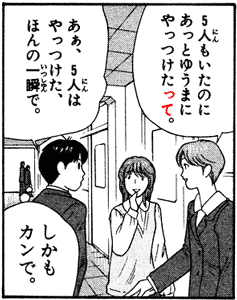
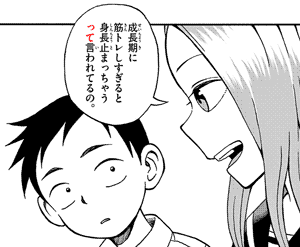
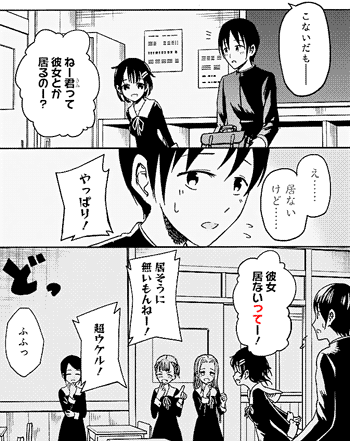
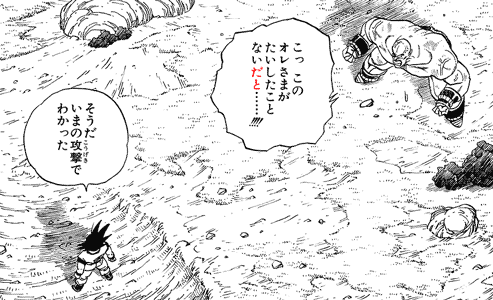

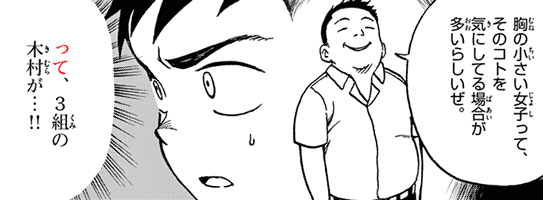
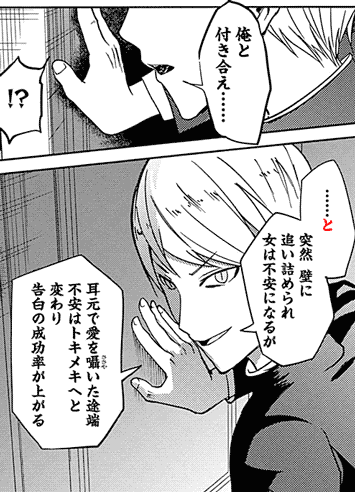
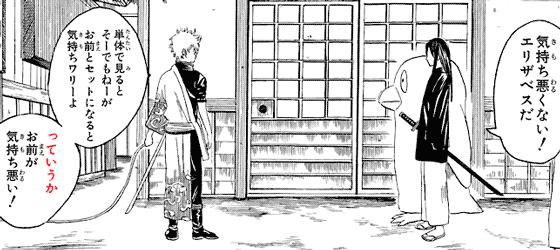
No comments: